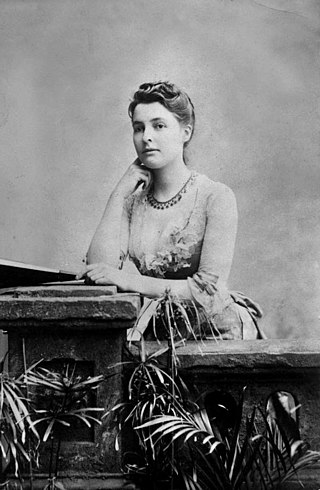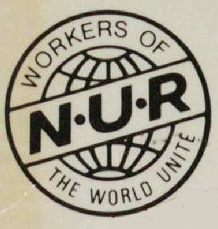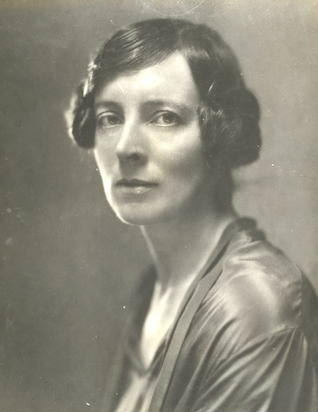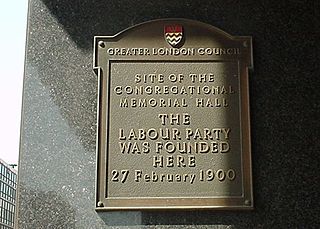Related Research Articles

James Ramsay MacDonald was a Scottish politician who served as Prime Minister of the United Kingdom, the first who belonged to the Labour Party, leading minority Labour governments for nine months in 1924 and again between 1929 and 1931. From 1931 to 1935, he headed a National Government dominated by the Conservative Party and supported by only a few Labour members. MacDonald was expelled from the Labour Party as a result.

Sidney James Webb, 1st Baron Passfield, was a British socialist, economist and reformer, who co-founded the London School of Economics. He was an early member of the Fabian Society in 1884, joining, like George Bernard Shaw, three months after its inception. Along with his wife Beatrice Webb and with Annie Besant, Graham Wallas, Edward R. Pease, Hubert Bland and Sydney Olivier, Shaw and Webb turned the Fabian Society into the pre-eminent politico-intellectual society in Edwardian England. He wrote the original, pro-nationalisation Clause IV for the British Labour Party.

Martha Beatrice Webb, Baroness Passfield, was an English sociologist, economist, socialist, labour historian and social reformer. It was Webb who coined the term "collective bargaining". She was among the founders of the London School of Economics and played a crucial role in forming the Fabian Society.

The Transport Salaried Staffs' Association (TSSA) is a trade union for workers in the transport and travel industries in the United Kingdom and Ireland. Its head office is in London, and it has regional offices in Bristol, Derby, Dublin, York and Glasgow.
In UK politics, the Parliamentary Labour Party (PLP) is the parliamentary group of the Labour Party in Parliament, i.e. Labour MPs as a collective body. Commentators on the British Constitution sometimes draw a distinction between the Labour Party and the Conservative and Liberal parties. The term Parliamentary Labour Party refers to the party in Parliament, whereas the term Labour Party refers to the entire Labour Party, the parliamentary element of which is the PLP.
The Co-operative Party is a centre-left political party in the United Kingdom, supporting co-operative values and principles. Established in 1917, the Co-operative Party was founded by co-operative societies to campaign politically for the fairer treatment of co-operative enterprise and to elect 'co-operators' to Parliament. The party's roots lie in the Parliamentary Committee of the Co-operative Union established in 1881.

Gareth Richard Thomas is a British Labour politician who has served as the Member of Parliament (MP) for Harrow West since 1997. He is currently Shadow Minister for Trade on the Opposition frontbench. Thomas served as Minister of State for International Development and Minister of State for Trade, Investment and Consumer Affairs between 2008 and 2010. He was the Chair of the Co-operative Party from 2001 until 2019, and stands for election as a Labour and Co-operative candidate.

The National Union of Railwaymen was a trade union of railway workers in the United Kingdom. The largest railway workers' union in the country, it was influential in the national trade union movement.

Arthur Augustus William Harry Ponsonby, 1st Baron Ponsonby of Shulbrede, was a British politician, writer, and social activist. He was the son of Sir Henry Ponsonby, Private Secretary to Queen Victoria, and Mary Elizabeth Bulteel, daughter of John Crocker Bulteel. He was also the great-grandson of The 3rd Earl of Bessborough, The 3rd Earl of Bathurst and The 2nd Earl Grey. The 1st Baron Sysonby was his elder brother.

The first MacDonald ministry of the United Kingdom lasted from January to November 1924. The Labour Party, under Ramsay MacDonald, had failed to win the general election of December 1923, with 191 seats, although the combined Opposition tally exceeded that of the Conservative government, creating a hung parliament. Stanley Baldwin remained in office until January 1924.

Sir Charles Philips Trevelyan, 3rd Baronet was a British Liberal Party, and later Labour Party, politician and landowner. He served as President of the Board of Education in 1924 and between 1929 and 1931 in the first two Labour administrations of Ramsay MacDonald, the first Labour Prime Minister.

Arabella Susan Lawrence was a British Labour Party politician, one of the earliest female Labour MPs.

Mary Agnes Hamilton CBE was a writer, journalist, broadcaster, civil servant, and the Labour Member of Parliament for Blackburn from 1929 to 1931.
George Lathan was a British trade unionist and politician. He was the Member of Parliament (MP) for Sheffield Park from 1929 to 1931 and from 1935 until his death.

The New Welcome Lodge, No. 5139, is a British Masonic Lodge open to all men working in the Palace of Westminster. At its founding, membership was limited to Labour Party Members of Parliament, but its scope was broadened soon after. The lodge is alleged to have influenced the outcome of the 1935 Labour Party leadership election.

The National Union of Distributive and Allied Workers (NUDAW) was a trade union in the United Kingdom.
Edward Frank Wise CB was a British economist, civil servant and Labour Party politician. He served as a Member of Parliament (MP) from 1929 to 1931.

The Labour Representation Committee (LRC) was a pressure group founded in 1900 as an alliance of socialist organisations and trade unions, aimed at increasing representation for labour interests in the Parliament of the United Kingdom. The Labour Party traces its origin to the LRC's foundation.
This article lists the Labour Party's election results from the 1922 United Kingdom general election to 1929, including by-elections.
Trade union sponsorship of UK members of Parliament was a phenomenon whereby a union supported a member of the House of Commons with financial contributions.
References
- Parliamentary Labour Club Rules, 1924.
- Owen, Nicholas (1 January 2007). "MacDonald's Parties: The Labour Party and the 'Aristocratic Embrace', 1922–31". Twentieth Century British History. 18 (1): 1–53. doi:10.1093/tcbh/hwl043.